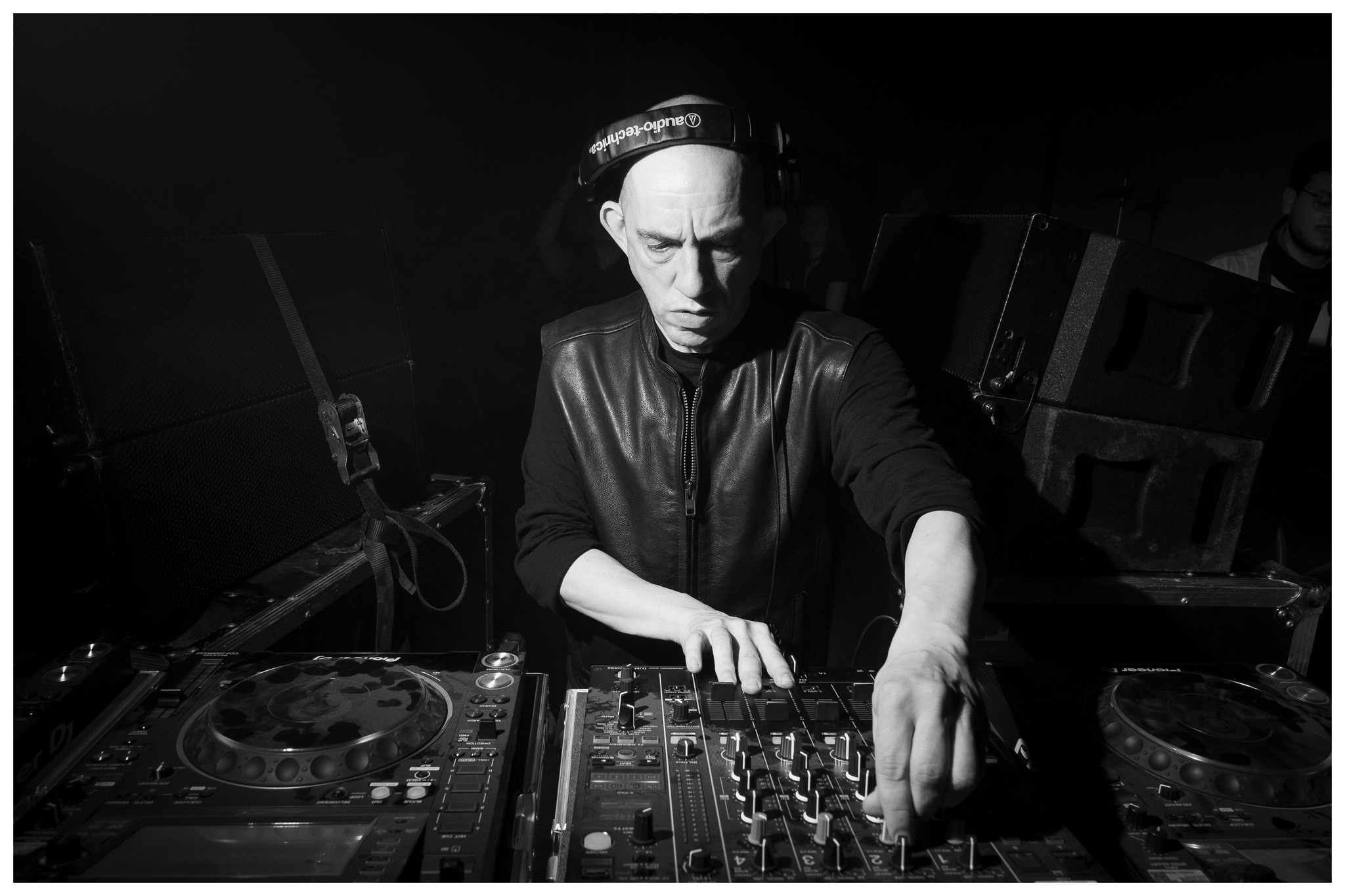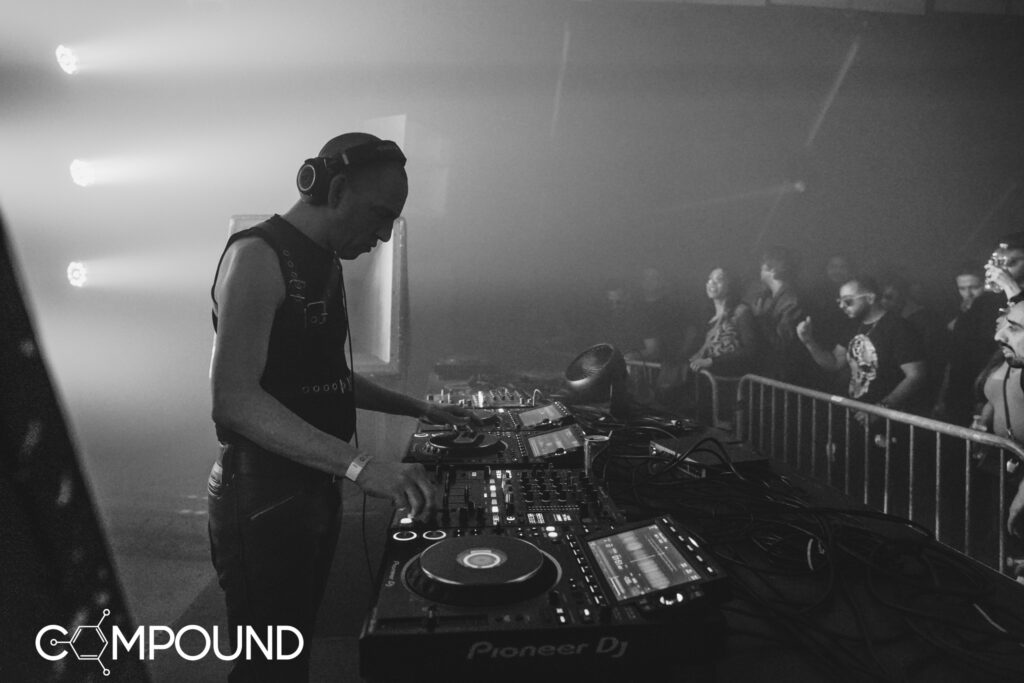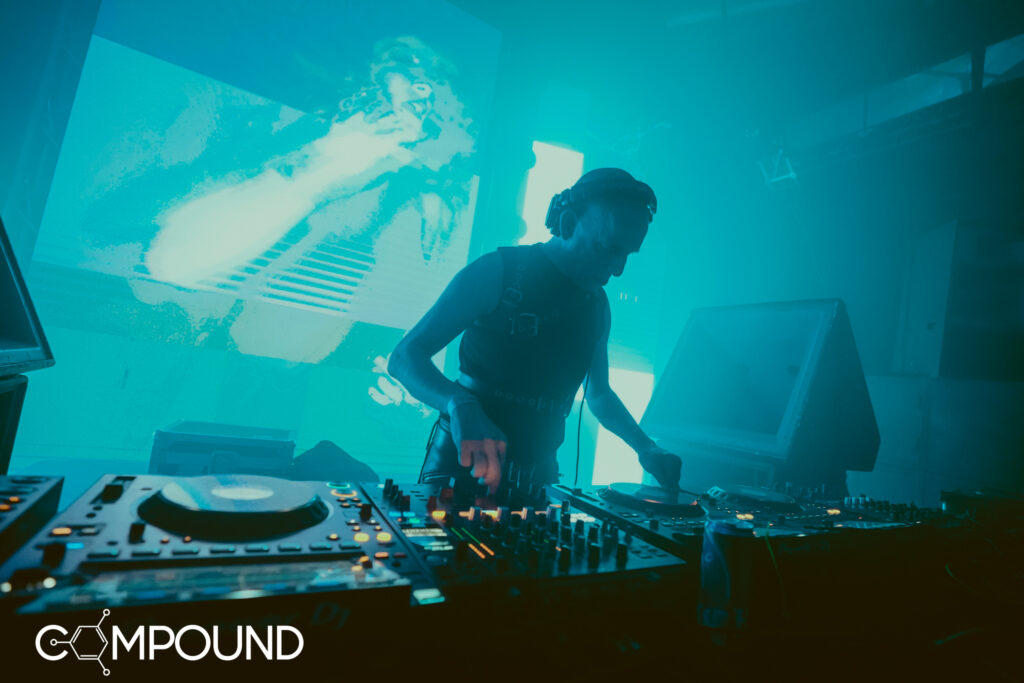
A pillar of the NYC scene since the early 90s, Adam X’s pioneering work has bridged the gap between Industrial/EBM and Techno, with his Sonic Groove imprint still pumping out records thirty years later. If you are looking for an artist that has stayed true over the years without compromising integrity, look no further. His work has not only stood the test of time, but continues to inspire music around the globe.
After playing an epic NYE set for us in LA, we took the opportunity to interview Adam as he reflects on the zeitgeist, his projects and gigs old and new, and the evolution of underground techno in America and Europe.
Dirty Epic: You first played LA in the early 90s, and now you’ve played here to start 2024. What has LA been like for you over the years? What do you think has changed, and what has stayed the same?
Adam: I always love playing in Los Angeles. Rarely have I played a bad event there. In the past several years, it has been more reminiscent of the early 90s with the underground warehouse scene in DTLA.
There was a period from the late 90s into the early 2000s where it was tough to throw underground events in LA County due to police task forces cracking down on such parties. The RAVE Act did not help much in those early millennium years either.
I played around 25 events in LA between 1998-2001. Most were held outside of LA County in legal venues, with many being held by different organizers in the Fox Theater in Pomona each week. Promoters were struggling with finding venues in the city that could stay open past 2 AM. The scene lacked that underground vibe that is very present in DTLA now.
Regarding the differences in events now and then, there are differences in the technology with DJs playing digitally versus vinyl, dress styles, and now everyone with smartphones. Overall, not much has changed in the way of raving at a warehouse party and techno music.

Dirty Epic: You’ve hosted some legendary parties and helped grow the New York scene in the early 90s with your label, Sonic Groove. What were those parties like, and what was unique or special about the New York rave scene?
Adam: The difference in the scene in NYC, compared to other cities like LA in the 90s, was that we had a booming scene that could regularly pull thousands of heads with only a lineup of purist underground techno-centric sounds.
In the mid-90s, the sounds of Trance music and Progressive House were the dominant electronic music genres out west (LA, SF, Phoenix, etc.) In the mid-south and east-southern regions of the country, funky Breaks, DnB, and Jungle were massive.
Other than in NYC (with exception of the North Midwest) you’d be hard pressed to find an event that would only book underground Techno artists/DJs. Elsewhere, it was all too common to find rave promoters hosting Jungle, Trance, and House DJs all on the same event, which often felt vibe-less.
We also had a great scene of music-making Techno artists in NYC and a large customer base of record buyers. We would sell several hundred copies of classic Techno records like Dave Clarke’s Red Series, Plastikman’s Spastik, or Joey Beltram’s Energy Flash. There was no place else in the country that was selling Techno music on the level NYC was. It was a truly amazing time.
Dirty Epic: You had an anonymous project, Traversable Wormhole, that you used while transitioning from New York to Berlin. Was doing an anonymous project more a creative decision or a practical one? Do you think an anonymous project could still make sense today in the social media era or is it a bit of a lost art?
Adam: I was already in Berlin for two years before I created Traversable Wormhole. I’d say it was both a creative and practical decision. I’ve always liked deeper trippier sounds in Techno and wanted to explore other sounds outside of the Industrialized Techno that I was making at the time without any stigmas attached (which happens very frequently in Techno). People always tend to pigeonhole you into only doing one style, and if you switch and make something different than the norm, then the stigmas often apply.
I don’t think an anonymous project would work too well now. At the time of Traversable Wormhole, promoters mainly booked DJs because of their music releases. In this day and age, many promoters book DJs based on social media likes and presence. Many modern Insta DJs have no music production to back themselves up on.
Back in the day, it was all about how big the records you produced were or if you were putting high quality out consistently. Back then, if you made the tracks people wanted to hear, you got booked. There were a few DJs who didn’t produce much but were scene starters with big labels and events. There was a relatively small percentage of DJs who played out.
Dirty Epic: I hear many DJs saying that there’s a lot of EBM and Industrial in the new Hard Techno wave. Do you think that’s true? Are there elements of EBM and Industrial in Hard Techno?
Adam: This Nu-Rave Techno thing has next to no elements of Industrial or EBM. EBM on a purist level is based around syncopated bass lines at a slower groove of 115-128BPM, hence the term body music due to the slower tempos. Real Industrial music is mainly noise over broken-beat rhythms, not with synth lines or big rave sounds. Industrial Techno should have a minimalistic sound like factory machines. I hear none of this in Nu-Rave.
Just because you turn the tempo up and play harder music doesn’t mean it’s industrial. Nu-Rave to me is not much different from the Schranz music genre from 20 years ago. When I was pioneering the Industrial / EBM sound in Techno back then, there was no connection between what I was making and this genre.
For those reading this who aren’t sure what Industrial Techno is, feel free to check out Statiqbloom, Orphx, and Monolith on my Sonic Groove imprint. These are pure Industrial Techno artists who have been deep into the Industrial/EBM music scene for years.
Dirty Epic: Any hot takes you want to share on Hard Techno in general?
Adam: Hard Techno was way better in the 90s and last decade when it was slower and more innovative. I’m hearing very little cutting-edge Hard Techno at the moment. Playing at a faster tempo doesn’t make your music harder, it just makes it faster. I watch audiences lose energy at fast tempos after a few hours into the night. I never saw this when the tempos were around 130BPM; It’s the perfect tempo from night into the morning.
Dirty Epic: You’ve seen a lot of movements in terms of the ebbs and flows of what’s trendy, whether it’s clubs, styles, genres, production tools, the way people get their music, etc. How have you adapted, and how have those changes shaped you as an artist?
Adam: To be honest I don’t try to adapt. I’m never one to bandwagon jump to a style that becomes a trend because everyone else is doing it. I just do what I feel. It can be less on the booking side when a new style is trendy and you don’t follow suit, but I’m fine with staying true to myself and taking fewer gigs in a year to play what I love.
I don’t clear dance floors by playing slower BPMs, and I never have an issue playing after someone plays 145-150BPM. It can take a song or two for the audience to adapt to the slower tempo at the beginning of a set, but losing the vibe of the audience is usually not a problem for me.
Dirty Epic: When it comes to picking out tracks for your sets, do you prefer old vinyl or new releases?
Adam: I love to play both out. I make a lot of edits of old-school Techno so that they sound up to date on production. I love mixing them into brand-new releases. Techno is timeless music, so I don’t limit my sets to any era. Great music is great music.

Dirty Epic: What are some key differences between the American and European Techno scenes from your perspective?
Adam: At this current time and much different than last decade, Techno in Europe has become much more commercial with big club and festival events. Due to a very poor economy, there are very few underground promoters throwing events here at the moment. This is causing a lot of music-making artists to not be booked regularly. The bigger events are focused only on social media presence from DJs.
In the USA, the scene went through this commercial behavior with EDM last decade. Underground Techno has been creeping up nicely across the USA. The events and clubs are not super massive, so promoters are booking more music production-based artists. I find a lot of the Techno promoters in the USA book what they like and don’t care so much about social media presence.
Dirty Epic: We have a big scene here in LA, but it feels a bit isolated at times. This seems to be a bit of a barrier for artists, especially up-and-comers. How have you managed to stay connected throughout your career and push through those types of barriers?
Adam: I always pushed through these barriers by releasing music on relevant labels. If you look at the LA scene for Techno, those artists who produce great tracks, like Silent Servant (R.I.P. My Friend), Drumcell, Truncate, and Developer all broke through these same barriers. For up-and-comers, it’s a bit harder now to break through for the reasons I just discussed, but if they stay persistent and make high-quality music they will eventually get noticed.
Dirty Epic: In previous interviews, you spoke about how early on, some of the bigger names were maybe a bit too into the money aspect, perhaps at the expense of the rave spirit. With all the money involved now, how do we maintain integrity?
Adam: All we can hope is for more underground promoters to surface like in the past that focus on booking DJs who are talented but who are also making great music. This formula worked very well from the late 80s to right before the pandemic. What is happening now is just big business focused on branding and social media presence.
There needs to be more support for the musicians who keep the music moving in this scene, from young to old…because without good innovative music being propped up at events, we will just find Techno music being more and more diluted and the more talented moving on to do something else in life.
Dirty Epic: What have you been working on lately? Anything that we should keep an eye out for?
Adam: I just recently released “My Acidic Being” on Pinkman Records from Rotterdam. I’ve been working on new music again after a break. I’m not sure where it will be placed but there will be some new music released from me in the 2nd part of the year. Also, there is a brand new DJ mix from me hosted on Slam Radio.
-Interviewed by Taylor Harris
Links:
RA: https://ra.co/dj/adamx
Discogs: https://www.discogs.com/artist/3027-Adam-X
Website: http://www.adamx.net/
Check out Dirty Epic music recommendations here.
Listen to our podcasts here.
Find out more about our Events here.
Listen to our review picks here.

